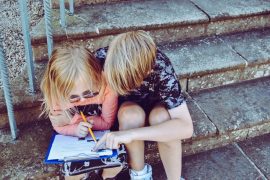Let’s look at some examples:
“Would you like to put your shoes on now or in the next five minutes?”
“Which toothbrush would you like to use?”
“Would you like a ham or cheese sandwich?”
“Which bowl and plate would you like to use?”
“Would you like to use crayons or paint today?”
If you find you are struggling with your child, you could also incorporate some fun choices into the mix. So if you’re having a battle getting your child going upstairs to bed, you could ask, “Would you like to fly up the stairs like superman or go slowly up each step like a robot?” (I often have to fly my 4-year-old up the stairs like superman, despite telling her one day I won’t be strong enough to keep carrying her!).
Again, think about how you would feel if someone said, “Get your shoes on now“, or if they said, “Were going out soon so you could get your shoes on now or in five minutes“. It sounds silly, but really do think about how some of the statements you use to your child would make an adult feel.
3. Instead of punishments encourage cooperation
When parents punish their children it makes children feel bad, ashamed and also resentful towards the parent. And when a child feels bad about themselves it takes the focus off what has actually happened and decreases their self esteem.
Punishments do more harm than good and the lesson you want to teach is never really taught.
In a situation where you would usually default to one of your discipline techniques, try:
1) Stating what you see.
“I see that you have spilt paint all over the floor”
or
“There’s a beautiful mess all over the floor, but we’re going to have to clean this up!”
2) Then give information about the problem instead of accusations and blaming.
“Someone could slip on that paint and the paint can also stain the furniture”
or
“I would hate for someone to stand on that and not see it.”
3) Make it about you.
Tell them how it makes you feel (it’s important not to pull their character apart here or label/name call them by saying things like, “You’re so clumsy“, or, “I’m fed up of you always making a mess“). What you want to do here is talk about your feelings (this also models to them how to communicate theirs).
“Paint on the floor really upsets me as I don’t want to ruin the furniture as I like to look after things”
4. Finally you can brainstorm solutions.
You can write them down or talk about them. This helps parent and child be in relationship with one another, opposed to division or segregation.
Children don’t mean to do things that upset you and we don’t want to push them away, reject, shame or isolate them should they make a mistake.
Brainstorming solutions is a great way to cooperate together. When this becomes the norm, your child will naturally start to find solutions. (I have at times found my two- and four-year-old cleaning up their own mess should they spill a drink or drop something. They will go and find wipes or a cleaning cloth and just clean it up by themselves!)
Brainstorming solutions also helps children feel in control and part of a team.
“I think we need to clean this paint up. Any ideas how we can do this? Mop, wipes, spray, etc”
or
“Hmmm I think we’re going to have to get rid of this paint somehow. Do you have any suggestions?”
I hope some of these suggestions have been useful and I’d love to know if you use any of these ideas with your children.
The intention is to move away from shouting and power struggles, moving towards less hostility in the household.
These ways foster a more peaceful, gentle, connective way.
If you are struggling at all and would like some one-to-one support in a non-judgemental safe space, you can book a call with me here.
Fiona Ng lives in the North East of England with her two daughters (aged two and four) and positively co-parents with their dad. She’s been a stay-at-home working mum for four years so knows that the struggle is REAL when it comes to parenting.
She helps parents who know some changes need to be made but just don’t know where to start. She understands that not every parent has the time or desire to consume and read all the parenting books. The books are great but radical changes weren’t made in her own family until she decided to go all in with her own parenting.
Being obsessed with self development and psychology, she took her desire to learn more about why we do what we do and qualified as an NLP Practitioner and later became qualified as a Parenting Coach with the Jai Institute of Parenting. She also holds a BA Hons Degree in Tourism Management and prior to becoming a mum was an Event Manager in the hospitality industry. You can find out more on her website and on her Instagram and Facebook pages.










